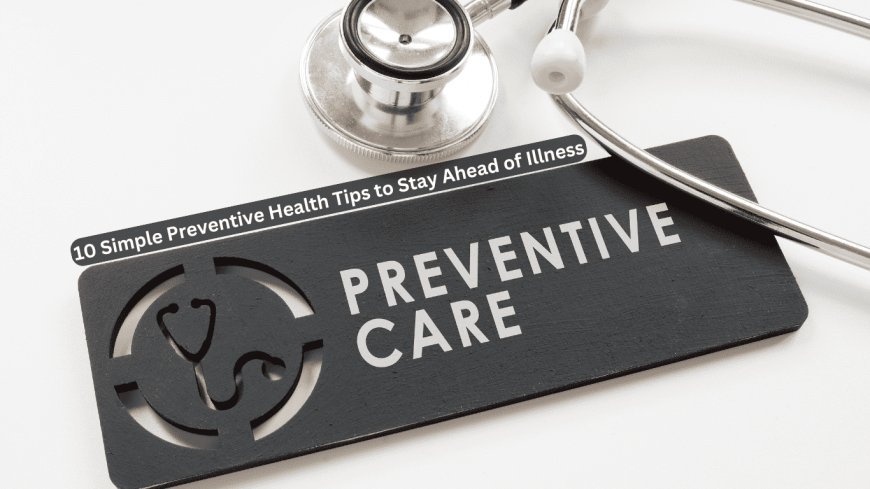10 Simple Preventive Health Tips to Stay Ahead of Illness
Stay ahead of illness with these 10 simple preventive health tips. Learn easy, actionable habits to improve your overall well-being and reduce the risk of diseases.

Introduction: Stay Ahead of Illness with Simple Preventive Health Tips
In a world of stress, bad food, and sedentary lifestyles, sickness prevention is crucial. The good news? Simple practices you may implement into your regular routine are preventive health. You don't need a comprehensive wellness plan or much time to keep healthy and avoid significant health concerns. Small changes in your everyday routine might help you prevent the flu this season or establish a robust immune system for future diseases.
This article covers 10 basic preventative health strategies to help you avoid disease, increase immunity, and improve long-term health. No matter your schedule, these ideas are simple and sustainable. Explore them!
1. Prioritize Sleep for a Stronger Immune System
We all know, “You need to get your beauty sleep,” but did you realize that sleep is also crucial to sickness prevention? A healthy immune system requires sleep to repair and restore the body. Lack of sleep lowers immunity, leaving you more vulnerable to infections, viruses, and chronic diseases.
How to Improve Sleep:
- Get 7-9 hours of good sleep each night.
- Try to sleep and wake up at the same time every day.
- Try avoiding devices, dimming the lights, and doing soothing activities before bed.
- For best sleep, keep your bedroom cold, dark, and quiet.
2. Stay Hydrated to Keep Your Body Functioning Properly
We need water for everything from digestion to temperature control. Dehydration impairs bodily function, causing sluggishness, headaches, and disease. Staying hydrated flushes toxins and boosts immunity.
Hydration Tips:
- Aim for 8 glasses (2 liters) of water a day, more if active.
- Cucumbers, watermelon, and oranges are hydrating foods.
- Sugary beverages like soda and caffeine dehydrate.
3. Eat a Balanced Diet Packed with Nutrients
As the saying goes, “you are what you eat,” and your diet affects your health. A balanced diet with a diversity of nutrients is one of the best preventative health measures. Choose entire, unprocessed meals and a colorful plate with vitamins, minerals, and antioxidants.
Key Foods for Prevention:
- Spinach and kale increase immunity and decrease inflammation.
- Oranges and grapefruits provide vitamin C, which boosts immunity.
- Almonds and flaxseeds give healthful lipids and fiber.
- Lean protein (chicken, tofu, fish) for muscle recovery and wellness.
4. Exercise Regularly to Improve Overall Health
Regular exercise promotes health, immunity, stress reduction, and sleep. Going for a walk, jog, yoga, or weight training keeps your body robust and ready to combat disease.
Exercise Tips:
- Most days, aim for 30 minutes of moderate activity.
- Enjoyable activities make routines simpler.
- For overall health, combine cardio, strength, and flexibility.
5. Manage Stress Effectively for Better Health
Chronic stress may damage your immune system, increase inflammation, and make you worse. Stress may cause anxiety, sadness, and motivation issues. Stress management is essential to health and disease prevention.
Stress Management Strategies:
- Daily mindfulness meditation or deep breathing.
- Pause work or obligations to recharge.
- Reduce stress with calming activities or family time.
- Nature reduces stress, as established by science.
6. Don’t Skip Your Regular Health Check-ups
Regular doctor visits are crucial to preventative health. Regular screenings and examinations may detect health issues early, making them easier to treat. High blood pressure, diabetes, and other cancers may not exhibit symptoms until they're advanced.
Preventive Care Tips:
- Schedule yearly physicals even if you're well.
- Keep your flu vaccinations, mammograms, and blood tests up to date.
- Discuss health issues with your doctor.
7. Practice Good Hygiene to Prevent Infections
It's easy to overlook that good cleanliness may prevent disease. Regularly washing your hands, cleaning your house, and covering your mouth while you cough helps limit germ exposure.
Hygiene Tips:
- After bathroom use or contacting public surfaces, wash your hands for 20 seconds with soap and water.
- Doorknobs, light switches, and counters should be decontaminated.
- To avoid germs, stay home while unwell and avoid direct contact with sick people.
8. Get Plenty of Sunlight for Vitamin D
Vitamin D is essential for immunity and health. Sunlight is one of the simplest methods to increase vitamin D levels, which helps prevent sickness and osteoporosis.
Vitamin D Tips:
- Daily sunshine exposure should be 15–30 minutes, depending on skin tone.
- Eat fatty fish (salmon), eggs, and fortified dairy for vitamin D.
- Vitamin D supplements are recommended for winter and low-light areas.
9. Quit Smoking and Limit Alcohol Consumption
Smoking and alcohol abuse impair the immune system and raise the risk of chronic illnesses, including lung cancer, heart disease, and liver damage. Quitting smoking and drinking less is one of the finest things you can do for your health.
Healthy Habits to Quit Smoking and Cut Back on Alcohol:
- Get expert assistance or join a support group to stop smoking.
- Limit alcohol intake to one drink per day for women and two for men.
- Replace bad habits with exercise or a creative activity.
10. Maintain a Healthy Weight
Maintaining a healthy weight lowers your chances of heart disease, diabetes, and joint difficulties. Maintaining weight and health requires a balanced diet and regular exercise.
Weight Management Tips:
- Think about portion management and mindful eating.
- Increase your intake of fruits, vegetables, and lean proteins.
- Stay active by exercising and moving more throughout the day.

 shofiul
shofiul 





